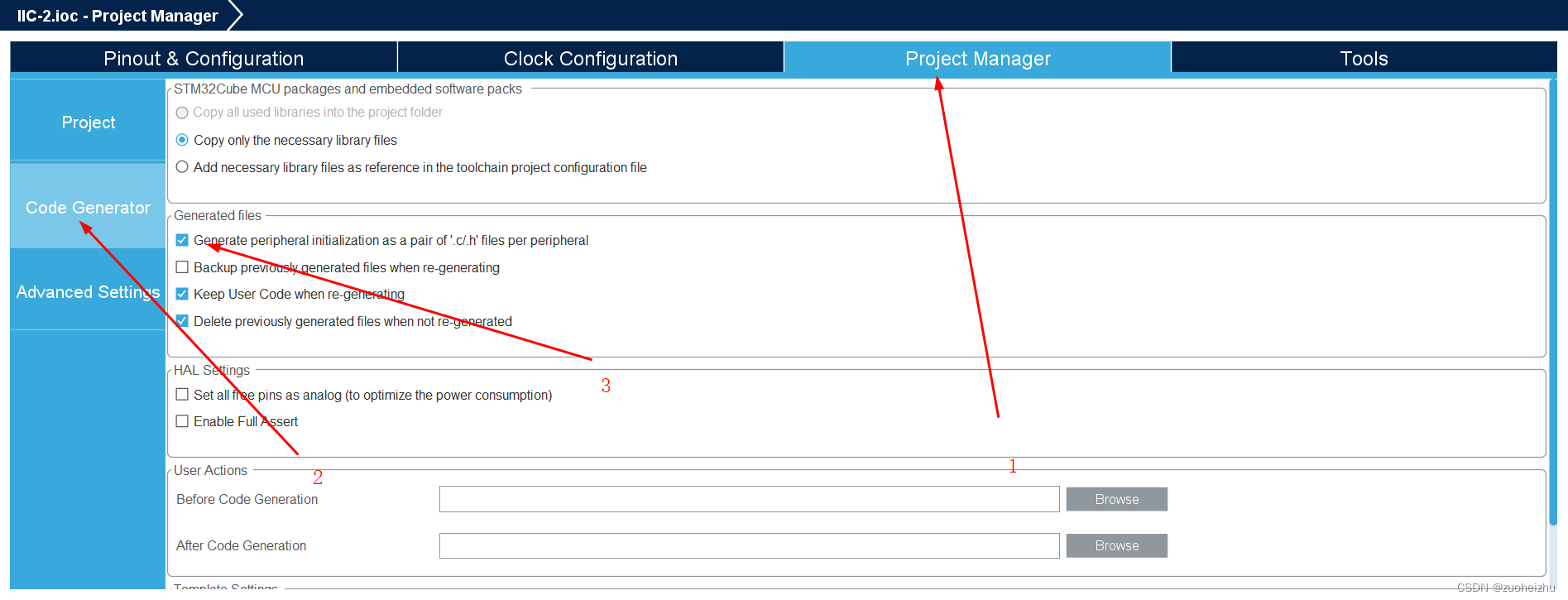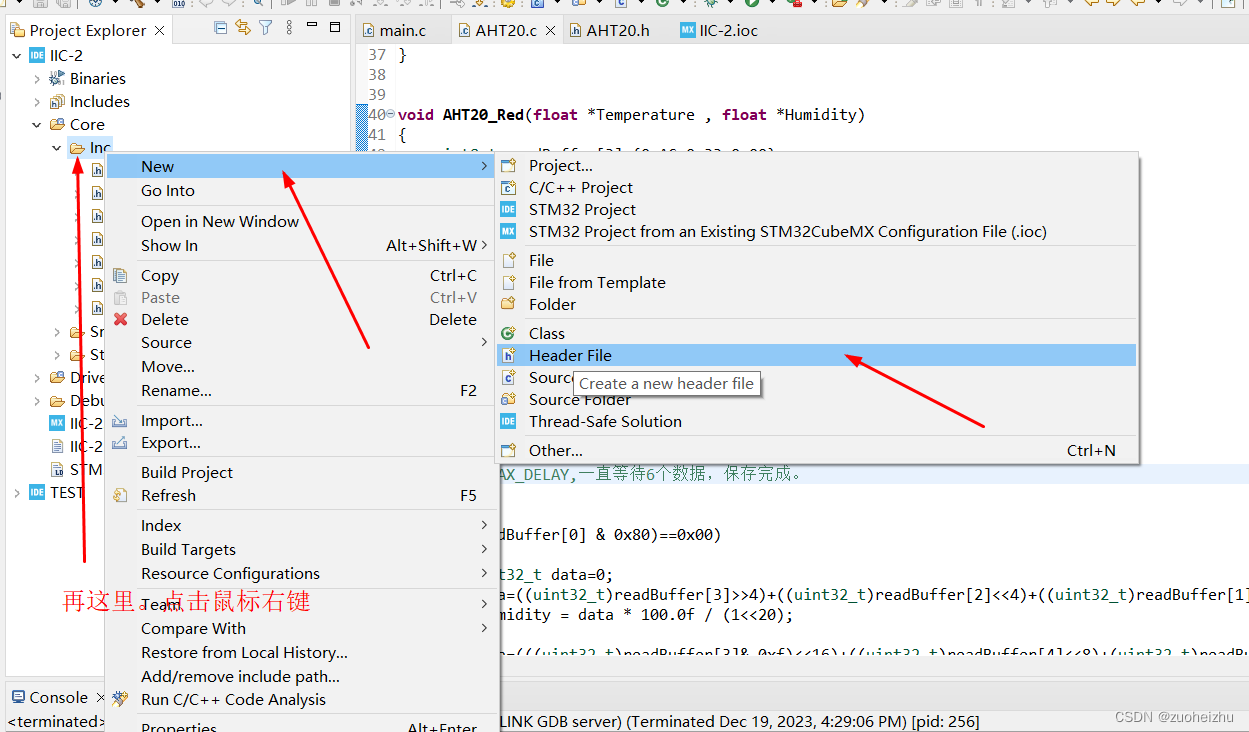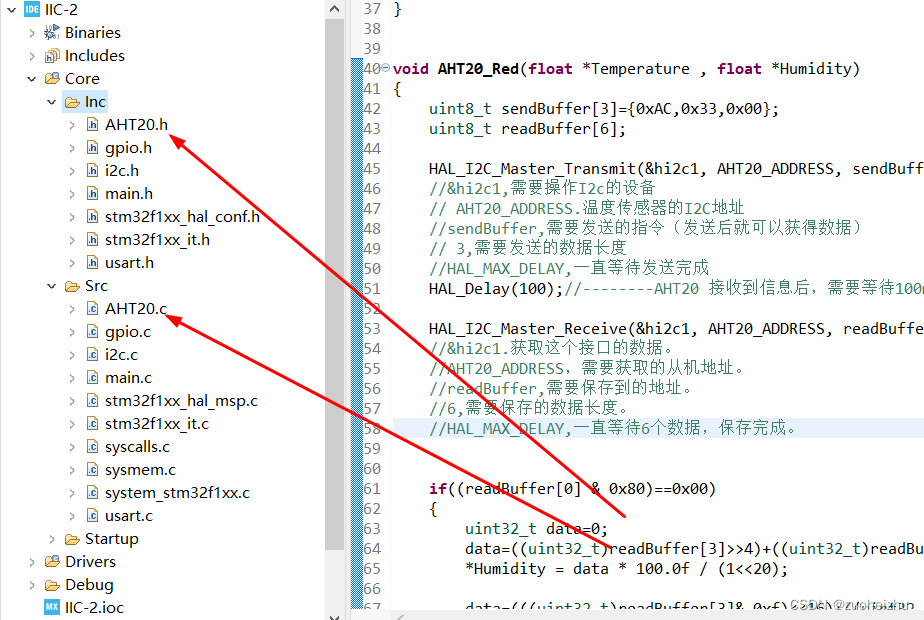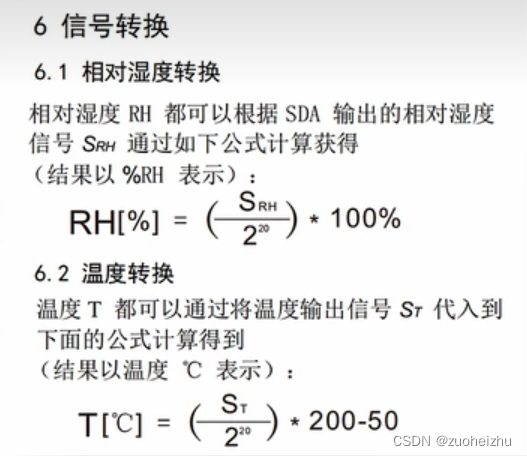STM32-I2C通讯-AHT20温湿度检测
发布时间:2023年12月20日
非常感谢,提供的视频学习
https://www.bilibili.com/video/BV1QN411D7ak/?spm_id_from=333.788&vd_source=8ca4826038edd44bb618801808a5e076
该文章注意:串口显示中文会乱码,必须选用支持ASCII的串口助手,才能正常显示中文。
图形化界面配置好,串口,和I2C


首先,给每个外设,都生成.h和.c文件

在相应文件夹中,建立.h和.c文件




建立ATH20.C文件
#include "AHT20.h"
#define AHT20_ADDRESS 0x70
//这里定义从机地址,由于AHT20从机为0x38。
//因为这个AHT20 ,从机地址为7位,所以需要左移一位,变成8位。
//所以,0x38,左移一位后,变成了0x70
void AHT20_Int()
{
uint8_t readBuffer;//用来存放,AHT20工作状态是否正常的数据。是否为0x38
HAL_Delay(50);//由于模块启动,需要等待40ms
HAL_I2C_Master_Receive(&hi2c1, AHT20_ADDRESS, &readBuffer, 1, HAL_MAX_DELAY);
//&&hi2c1,表示需要操作的i2c的端口。
//AHT20_ADDRESS,表示需要操作的从机地址。因为是读取数据,这个函数,会将AHT20——ADDRESS变成0x71
//&readBuffer,读取到的数据,需要放的地方。
//1,表示,需要读取1位数据
// HAL_MAX_DELAY,一直等待下去,直到接收完成。
if((readBuffer & 0x08)==0x00) //判断,AHT20,bit[3]是否为1。不为1,就进入程序进行初始化。
{
uint8_t sendBuffer[3]={0xBE,0x08,0x00};//需要定义这个数组,存放,初始化的数据。
HAL_I2C_Master_Transmit(&hi2c1, AHT20_ADDRESS, sendBuffer,3, HAL_MAX_DELAY);
//&&hi2c1,表示需要操作的i2c的端口。
//AHT20_ADDRESS,表示需要操作的从机地址。
//sendBuffe,需要发送的数据,读取到的数据,需要放的地方。
//3,表示,需要发送3位数据
// HAL_MAX_DELAY,一直等待下去,直到发送完成。
}
}
void AHT20_Red(float *Temperature , float *Humidity)
{
uint8_t sendBuffer[3]={0xAC,0x33,0x00};
uint8_t readBuffer[6];
HAL_I2C_Master_Transmit(&hi2c1, AHT20_ADDRESS, sendBuffer, 3, HAL_MAX_DELAY);
//&hi2c1,需要操作I2c的设备
// AHT20_ADDRESS.温度传感器的I2C地址
//sendBuffer,需要发送的指令(发送后就可以获得数据)
// 3,需要发送的数据长度
//HAL_MAX_DELAY,一直等待发送完成
HAL_Delay(100);//--------AHT20 接收到信息后,需要等待100ms,让其完成测量
HAL_I2C_Master_Receive(&hi2c1, AHT20_ADDRESS, readBuffer, 6, HAL_MAX_DELAY);
//&hi2c1.获取这个接口的数据。
//AHT20_ADDRESS,需要获取的从机地址。
//readBuffer,需要保存到的地址。
//6,需要保存的数据长度。
//HAL_MAX_DELAY,一直等待6个数据,保存完成。
if((readBuffer[0] & 0x80)==0x00)
{
uint32_t data=0;
data=((uint32_t)readBuffer[3]>>4)+((uint32_t)readBuffer[2]<<4)+((uint32_t)readBuffer[1]<<12);
*Humidity = data * 100.0f / (1<<20);
data=(((uint32_t)readBuffer[3]& 0xf)<<16)+((uint32_t)readBuffer[4]<<8)+(uint32_t)readBuffer[5];
*Temperature=data * 200.0f/(1<<20)-50;
}
}
再建立,AHT20.h这个头文件。
#ifndef INC_AHT20_H_
#define INC_AHT20_H_
#include "i2c.h" //这个库文件,是这个软件自带的,所以直接引用就好。因为我们的程序种,会用到这个库函数里的内容。
void AHT20_Red(float *Temperature , float *Humidity);
void AHT20_Int();
#endif /* INC_AHT20_H_ */
主程序
/* USER CODE BEGIN Header */
/**
******************************************************************************
* @file : main.c
* @brief : Main program body
******************************************************************************
* @attention
*
* Copyright (c) 2023 STMicroelectronics.
* All rights reserved.
*
* This software is licensed under terms that can be found in the LICENSE file
* in the root directory of this software component.
* If no LICENSE file comes with this software, it is provided AS-IS.
*
******************************************************************************
*/
/* USER CODE END Header */
/* Includes ------------------------------------------------------------------*/
#include "main.h"
#include "i2c.h"
#include "usart.h"
#include "gpio.h"
/* Private includes ----------------------------------------------------------*/
/* USER CODE BEGIN Includes */
#include "AHT20.h"
#include <stdio.h>
#include <string.h>
/* USER CODE END Includes */
/* Private typedef -----------------------------------------------------------*/
/* USER CODE BEGIN PTD */
/* USER CODE END PTD */
/* Private define ------------------------------------------------------------*/
/* USER CODE BEGIN PD */
/* USER CODE END PD */
/* Private macro -------------------------------------------------------------*/
/* USER CODE BEGIN PM */
/* USER CODE END PM */
/* Private variables ---------------------------------------------------------*/
/* USER CODE BEGIN PV */
/* USER CODE END PV */
/* Private function prototypes -----------------------------------------------*/
void SystemClock_Config(void);
/* USER CODE BEGIN PFP */
/* USER CODE END PFP */
/* Private user code ---------------------------------------------------------*/
/* USER CODE BEGIN 0 */
//AHT20_Int();
/* USER CODE END 0 */
/**
* @brief The application entry point.
* @retval int
*/
int main(void)
{
/* USER CODE BEGIN 1 */
/* USER CODE END 1 */
/* MCU Configuration--------------------------------------------------------*/
/* Reset of all peripherals, Initializes the Flash interface and the Systick. */
HAL_Init();
/* USER CODE BEGIN Init */
/* USER CODE END Init */
/* Configure the system clock */
SystemClock_Config();
/* USER CODE BEGIN SysInit */
/* USER CODE END SysInit */
/* Initialize all configured peripherals */
MX_GPIO_Init();
MX_I2C1_Init();
MX_USART2_UART_Init();
/* USER CODE BEGIN 2 */
AHT20_Int();
float temperature,humidity;
char txt[50];
/* USER CODE END 2 */
/* Infinite loop */
/* USER CODE BEGIN WHILE */
while (1)
{
AHT20_Red(&temperature, &humidity);
sprintf(txt,"温度:%.1f,湿度:%.1f %%",temperature,humidity);
HAL_UART_Transmit(&huart2, (uint8_t*)txt, strlen(txt), HAL_MAX_DELAY);
HAL_Delay(1000);
// HAL_GPIO_TogglePin(GPIOA, GPIO_PIN_4);
// HAL_Delay(500);
/* USER CODE END WHILE */
/* USER CODE BEGIN 3 */
}
/* USER CODE END 3 */
}
/**
* @brief System Clock Configuration
* @retval None
*/
void SystemClock_Config(void)
{
RCC_OscInitTypeDef RCC_OscInitStruct = {0};
RCC_ClkInitTypeDef RCC_ClkInitStruct = {0};
/** Initializes the RCC Oscillators according to the specified parameters
* in the RCC_OscInitTypeDef structure.
*/
RCC_OscInitStruct.OscillatorType = RCC_OSCILLATORTYPE_HSI;
RCC_OscInitStruct.HSIState = RCC_HSI_ON;
RCC_OscInitStruct.HSICalibrationValue = RCC_HSICALIBRATION_DEFAULT;
RCC_OscInitStruct.PLL.PLLState = RCC_PLL_NONE;
if (HAL_RCC_OscConfig(&RCC_OscInitStruct) != HAL_OK)
{
Error_Handler();
}
/** Initializes the CPU, AHB and APB buses clocks
*/
RCC_ClkInitStruct.ClockType = RCC_CLOCKTYPE_HCLK|RCC_CLOCKTYPE_SYSCLK
|RCC_CLOCKTYPE_PCLK1|RCC_CLOCKTYPE_PCLK2;
RCC_ClkInitStruct.SYSCLKSource = RCC_SYSCLKSOURCE_HSI;
RCC_ClkInitStruct.AHBCLKDivider = RCC_SYSCLK_DIV1;
RCC_ClkInitStruct.APB1CLKDivider = RCC_HCLK_DIV1;
RCC_ClkInitStruct.APB2CLKDivider = RCC_HCLK_DIV1;
if (HAL_RCC_ClockConfig(&RCC_ClkInitStruct, FLASH_LATENCY_0) != HAL_OK)
{
Error_Handler();
}
}
/* USER CODE BEGIN 4 */
/* USER CODE END 4 */
/**
* @brief This function is executed in case of error occurrence.
* @retval None
*/
void Error_Handler(void)
{
/* USER CODE BEGIN Error_Handler_Debug */
/* User can add his own implementation to report the HAL error return state */
__disable_irq();
while (1)
{
}
/* USER CODE END Error_Handler_Debug */
}
#ifdef USE_FULL_ASSERT
/**
* @brief Reports the name of the source file and the source line number
* where the assert_param error has occurred.
* @param file: pointer to the source file name
* @param line: assert_param error line source number
* @retval None
*/
void assert_failed(uint8_t *file, uint32_t line)
{
/* USER CODE BEGIN 6 */
/* User can add his own implementation to report the file name and line number,
ex: printf("Wrong parameters value: file %s on line %d\r\n", file, line) */
/* USER CODE END 6 */
}
#endif /* USE_FULL_ASSERT */
文章来源:https://blog.csdn.net/zuoheizhu/article/details/135088213
本文来自互联网用户投稿,该文观点仅代表作者本人,不代表本站立场。本站仅提供信息存储空间服务,不拥有所有权,不承担相关法律责任。 如若内容造成侵权/违法违规/事实不符,请联系我的编程经验分享网邮箱:chenni525@qq.com进行投诉反馈,一经查实,立即删除!
本文来自互联网用户投稿,该文观点仅代表作者本人,不代表本站立场。本站仅提供信息存储空间服务,不拥有所有权,不承担相关法律责任。 如若内容造成侵权/违法违规/事实不符,请联系我的编程经验分享网邮箱:chenni525@qq.com进行投诉反馈,一经查实,立即删除!
最新文章
- Python教程
- 深入理解 MySQL 中的 HAVING 关键字和聚合函数
- Qt之QChar编码(1)
- MyBatis入门基础篇
- 用Python脚本实现FFmpeg批量转换
- FME软件安装教程及问题解决
- Node-RED 规则引擎:开启物联网时代的智能决策
- Geoserver发布shp图层服务
- 一、Vue3组合式基础[ref、reactive]
- 【教程】cocos2dx资源加密混淆方案详解
- STL(标准模板库)容器
- yaml是什么?yaml与kubernates是什么关系?在kubernates中怎么用yaml?
- SpringBoot 如何 配置端口号
- CentOS安装JDK
- 桶装水小程序开发